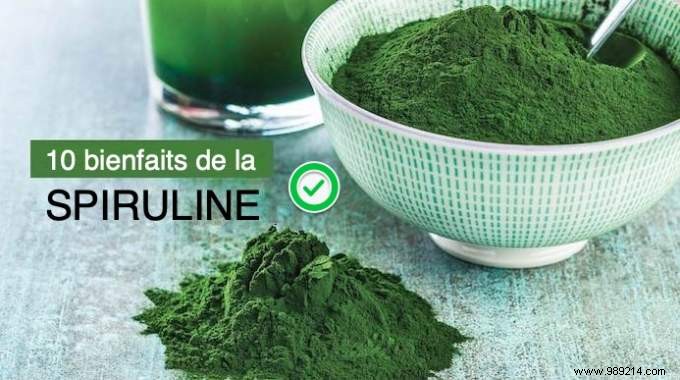
Spirulina algae is one of the most used natural food supplements in the world .
Besides, you have surely already spotted it in organic stores.
Rich in vitamins, minerals and antioxidants, its exceptional virtues on the body and the brain are widely recognized.
So, without further ado, here are the 10 scientifically proven benefits of spirulina . Watch:
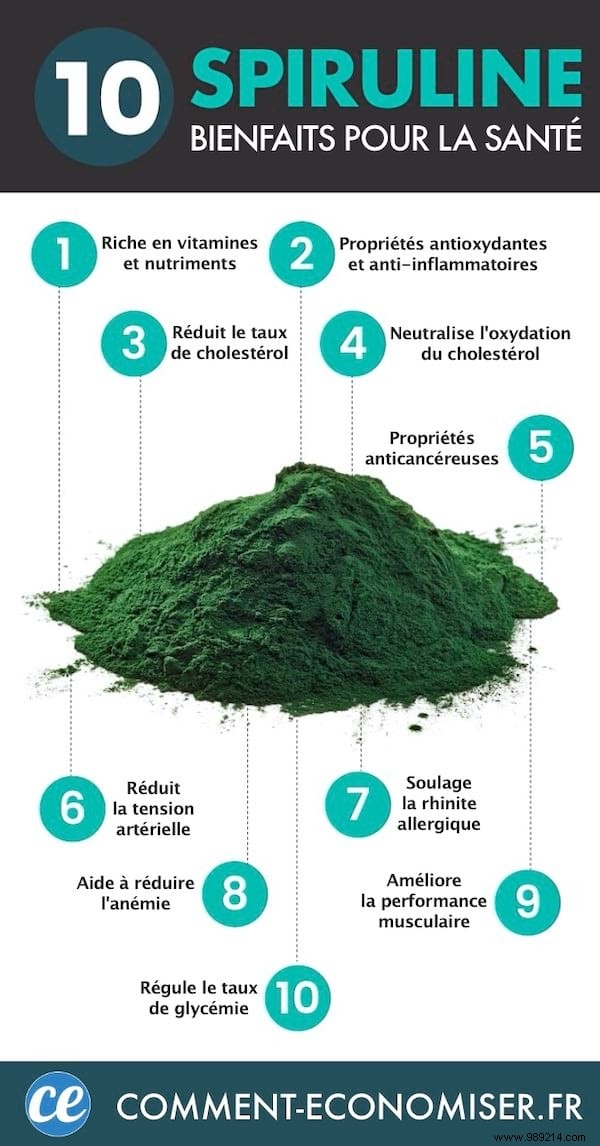
Click here to easily print this guide in PDF.
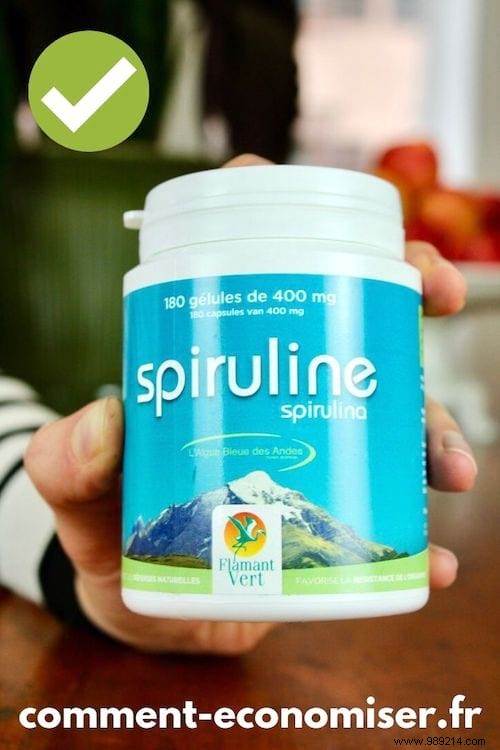
Spirulina is a freshwater micro-algae, which has the particularity of being both a plant and an aquatic bacterium.
It grows by forming blooms on the surface of tropical or subtropical water bodies.
Spirulina algae occurs naturally in the form of a coiled filament and has existed as such for more than 3 billion years.
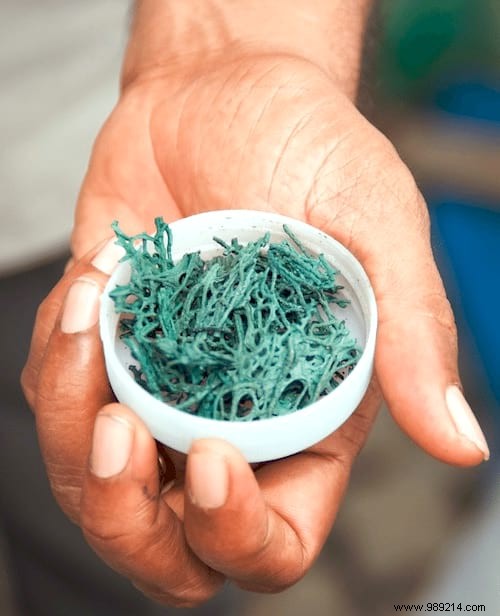
First cultivated mainly in California and Hawaii, it is now produced in a controlled way all over the world where the climate allows it.
Commercially, spirulina usually comes in capsules or in stamps , but also in the form of powder , sequins or twigs bright green.
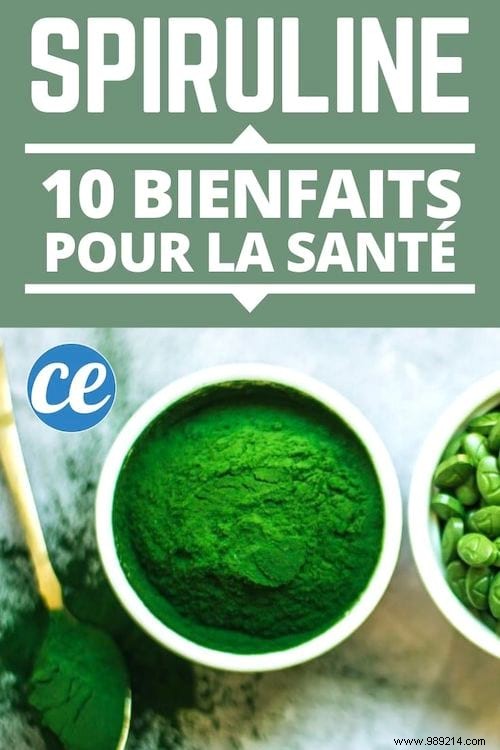
Spirulina is part of the family of cyanobacteria, also called blue algae.
Like plants, cyanobacteria can produce energy from sunlight through photosynthesis.
Consumed by the Aztecs several millennia ago, spirulina has become popular again since a NASA study proposed to cultivate it in space as a superfood for astronauts.
The recommended dose of spirulina is 1 to 3 g per day (1 teaspoon =3 g), but its effectiveness has also been proven with doses of up to 10 g per day.
This tiny micro-algae is literally a powerhouse of nutrients . Indeed, a single tablespoon (7 g) of spirulina powder contains:
- Proteins :4g
- Vitamin B1 (thiamine):11% of the recommended daily allowance (RDA)
- Vitamin B2 (riboflavin):15% of the RDA
- Vitamin B3 (niacin):4% of the RDA
- Copper :21% of RDA
- Iron :11% of RDA
Spirulina contains significant amounts of magnesium, potassium and manganese, but also small amounts of almost all other essential nutrients.
In addition, a tablespoon of spirulina contains only 20 calories and 1.7 g of carbohydrates.
It's simple:weight for pound, spirulina is surely the most nutritious food on the planet!
A single tablespoon (7g) of spirulina contains approximately 1g of omega-6 and omega-3 fatty acids, with a ratio between 1.5 and 1.0.
In addition, it has an excellent quality of easily assimilated protein intake.
Studies have shown that spirulina contains all the essential amino acids and can, as such, be compared to other sources of proteins of good biological value such as eggs or meat.
In summary: spirulina, a freshwater micro-algae, is one of the most nutrient-dense superfoods on the planet.
Oxidative stress is an attack on cells by free radicals, which weakens the body at the DNA and cell level.
An accumulation of these aggressions promotes chronic inflammation, which in turn can lead to cancer and many other diseases.
However, spirulina is particularly rich in antioxidants , which help protect the body against oxidative stress.
Its main component is phycocyanin, a mixture of proteins and pigments with powerful antioxidant properties, which gives spirulina its characteristic blue-green color.
According to studies, it is phycocyanin that gives spirulina its impressive antioxidant and anti-inflammatory effects.
Phycocyanin not only helps neutralize free radicals, but also decreases the production of cell signaling molecules that cause inflammation.
In summary: phycocyanin is the active ingredient of spirulina. This substance has powerful antioxidant and anti-inflammatory properties.
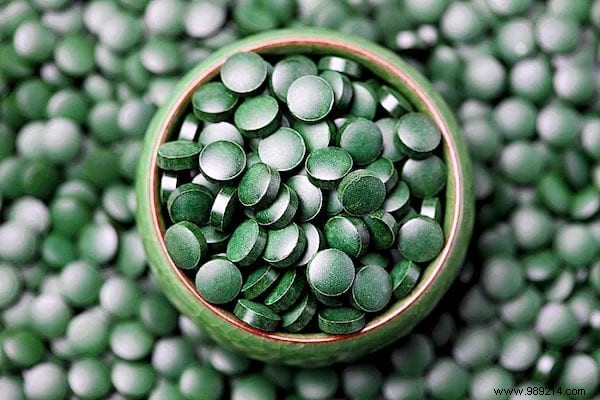
It's a fact:cardiovascular disease is the leading cause of death in the world.
The onset of cardiovascular disease is linked to many risk factors, and it turns out that spirulina has a positive impact on most of them.
For example, spirulina helps to reduce "bad" cholesterol levels (LDL) and triglycerides, while increasing the level of "good" cholesterol (HDL).
In a study of 25 people with type 2 diabetes, a dose of 2 g of spirulina per day significantly improved these cholesterol indices.
Another study in people with high cholesterol found that a dose of 1g of spirulina per day helped reduce triglyceride levels by 16.3% and "bad" cholesterol levels by 10.1%. (LDL).
Several other studies have confirmed the positive effects of spirulina to reduce cholesterol levels, but with higher doses, varying between 4.5 g to 8 g per day.
In summary: several studies have proven that spirulina helps reduce triglyceride and "bad" cholesterol (LDL) levels, while increasing "good" cholesterol (HDL) levels.
Fatty acids and other lipids inside your body are particularly susceptible to oxidative stress.
This is a phenomenon called lipid peroxidation, and it is one of the risk factors for many serious diseases.
For example, one of the main clues to the onset of heart disease is precisely the oxidation of "bad" cholesterol (LDL)
However, according to studies, the antioxidants in spirulina are particularly effective in reducing lipid peroxidation in humans and animals alike.
In a study of 37 people with type 2 diabetes, a dose of 8 g of spirulina per day significantly decreased indices of oxidative stress.
At the same time, this treatment also increased the levels of antioxidant enzymes in the blood.
In summary: your body's lipids are susceptible to oxidation, which can lead to many diseases. The high antioxidant content spirulina helps to reduce and neutralize this phenomenon.
Several studies indicate that spirulina has promising anticancer properties.
In fact, the researchers have notably discovered that, in animals, the micro-algae reduces the incidence of cancer as well as the size of tumours.
The anticancer properties of spirulina have been best studied on oral cancer.
In one study, researchers investigated the effects of spirulina in 87 people with oral submucosal fibrosis, a type of precancerous lesion in the lining of the mouth.
However, the researchers found that 45% of precancerous lesions disappeared in people who received treatment with 1 g of spirulina per day for a year – compared to only 7% in the control group.
Moreover, when these people interrupt their spirulina treatment, almost half of them develop new lesions the following year.
In another study on 40 people with precancerous lesions of the mouth, the researchers proved that a treatment of 1 g of spirulina per day leads to a greater improvement in symptoms than a drug treatment with Pentoxyfillin.
In summary: spirulina has anticancer properties, and research indicates that it is particularly effective against certain precancerous lesions of the mouth (oral submucosal fibrosis).
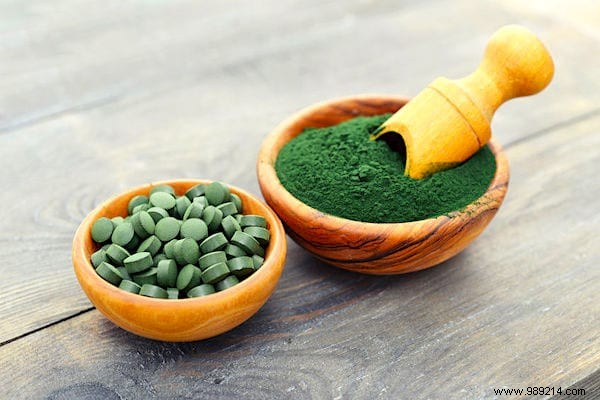
Hypertension is one of the main risk factors for several serious diseases.
Including heart attacks, strokes and chronic kidney disease.
Studies have shown that treatment with a dose of 4.5 g per day lowers blood pressure in people with normal values, while treatment with a dose of 1 g is not effective.
Researchers believe that this drop in blood pressure is the result of an increase in the production of nitric oxide, a molecule that helps dilate blood vessels.
In summary: a spirulina treatment helps to lower blood pressure , one of the main risk factors for many diseases.
Allergic rhinitis is a medical condition characterized by inflammation of the nasal passages.
It is caused by the presence of allergens such as animal hair, wheat dust and, in the case of hay fever, pollen.
However, spirulina is recognized as one of the most effective alternative treatments for relieving the symptoms of allergic rhinitis , and its effectiveness is scientifically proven.
A study in 127 people with allergic rhinitis proved that a treatment of 2 g per day significantly reduced several symptoms of this condition, including runny nose, stuffy nose, sneezing and itching.
In summary: make spirulina is particularly effective in reducing the symptoms of allergic rhinitis.
Anemia exists in several forms. The most common, iron deficiency anemia, is characterized by an abnormal drop in the level of hemoglobin in the blood.
Quite common in the elderly, anemia causes a prolonged feeling of weakness and fatigue.
In a study in 40 elderly people with a history of anemia, researchers found that taking spirulina as a dietary supplement caused increased levels of hemoglobin in red blood cells.
It also improves immune function.
However, more research is needed as this is the only study conducted on the benefits of spirulina for anemia.
In summary: the only study on this indicates that spirulina helps reduce anemia in the elderly, but more research is needed on the subject to be certain of its effectiveness.
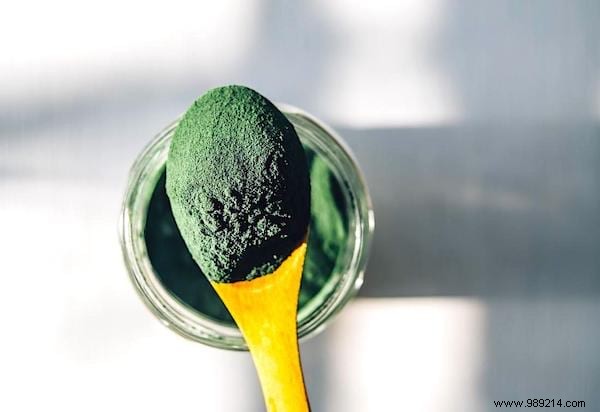
Practicing physical activity causes oxidative stress, which naturally leads to muscle fatigue.
However, certain plant foods have antioxidant properties that help athletes of all levels to reduce the harmful effects of oxidative stress on the body.
Scientific studies have shown that spirulina is also effective in increasing muscle power and endurance.
In two separate studies, researchers have proven that spirulina significantly increases the time before reaching muscle fatigue, thus improving endurance.
In summary: spirulina increases muscle performance , including endurance and muscle power.
Several studies in animals have already revealed that spirulina helps to significantly reduce blood sugar levels.
In some cases, a spirulina treatment is even more effective than synthetic diabetes medications, including metformin.
And the latest research also indicates that spirulina has the same anti-diabetic benefits in humans.
Indeed, a study from the University of Baroda revealed that a treatment of 2 g of spirulina per day leads to an impressive drop in blood sugar levels in people suffering from type 2 diabetes.
Baroda University researchers found that spirulina lowered levels of glycated hemoglobin – the molecule that helps determine blood glucose levels – by 9% to 8%.
This reduction is remarkable, because according to previous studies, a reduction of only 1% in the level of glycated hemoglobin helps to reduce the risk of a death related to diabetes by 21%.
However, more research is needed since the Baroda University study was small (only 25 people) and short in duration.
In summary: research indicates that spirulina helps to significantly reduce blood sugar levels fasting in people with type 2 diabetes.
Spirulina is part of the family of cyanobacteria, often referred to as "blue algae", and it has incredible health benefits.
It helps to naturally reduce blood lipid levels, protect the body against oxidative stress, lower blood pressure and even regulate blood sugar levels.
Thanks to its incredible richness in vitamins and minerals, spirulina is undoubtedly one of the rare "superfoods " worthy of the name.
Obviously, more research is needed before confirming its many benefits.
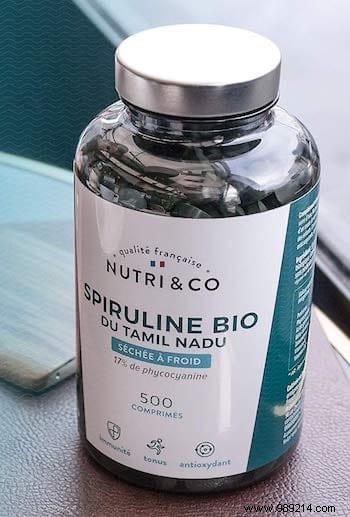
Preferably, spirulina is taken in the form of flakes or twigs.
But you can very well consume it also in tablets.
If you are looking for quality spirulina at a good price, I recommend this one that I use regularly.
Try to favor spirulina 100% pure, without additives or preservatives, and produced by hand in France.
You can also get spirulina in organic stores or from local producers.
If you buy your spirulina on the Internet, it is essential to check its origin before consuming it.
Warning: in high doses, spirulina can trigger headaches and intestinal pain. It is also contraindicated in pregnant women and people with kidney failure.
You have tried spirulina as a dietary supplement ? Let us know in the comments if it worked for you. We can't wait to read you!